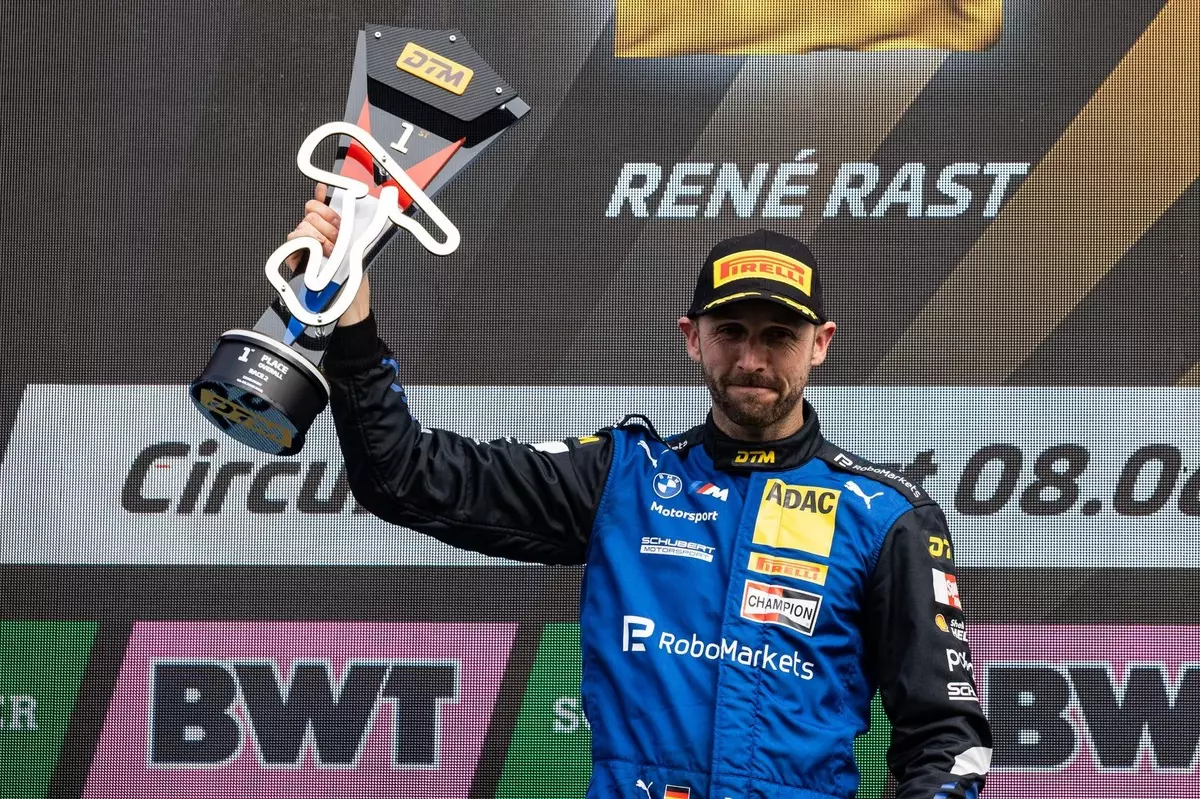Rene Rast’s Unyielding Spirit: A Daring Tale from DTM
In the adrenaline-fueled world of motorsport, tales of resilience and determination often emerge, yet few are as compelling as Rene Rast’s recent experience at the DTM race in Zandvoort. As a three-time DTM champion, Rast is no stranger to high-stakes competitions. However, just moments before one of the weekend’s most anticipated events, he faced an unexpected hurdle: a significant head injury. This unforeseen challenge turned what was expected to be a routine race into a testament to his mental and physical fortitude.
The collision with the pitwall was not merely a physical setback for Rast; it transformed his race into an intense battle for victory. The incident tested his limits in ways that few could imagine. Despite the pain and the odds stacked against him, Rast’s determination shone through, showcasing his unwavering commitment to excellence on the track. For those who witnessed it, this race was not just about speed or skill but about the sheer willpower required to overcome adversity.
I remember watching the race unfold with bated breath, marveling at how someone could push through such adversity. It’s moments like these that remind us why we love sports. They reveal the incredible strength of human spirit and the relentless pursuit of dreams, no matter the obstacles. As spectators, we are inspired by these stories, learning that perseverance is not just a trait but a way of life.
Key Takeaways
- Rene Rast demonstrated extraordinary resilience during the DTM race despite sustaining a head injury.
- The incident highlighted the importance of mental toughness and determination in high-pressure situations.
- Rast’s story serves as a reminder of the risks involved in motorsport and the critical role of safety protocols.
Pressing On Through Pain
After sustaining his injury, Rast showed remarkable courage and focus that many might find difficult to muster under similar circumstances. In a post-race interview, he candidly admitted to having a headache but downplayed its severity, revealing only part of the struggle he faced. With painkillers as his ally, Rast managed to maintain clarity throughout the race. His ability to compete and ultimately triumph while dealing with physical discomfort speaks volumes about his dedication and passion for racing.
The race was not just about showcasing speed but was also a grueling test against his own body. As symptoms intensified, including dizziness and tingling in his fingers, any lesser driver might have succumbed to these challenges. Yet Rast persisted through each lap with an unwavering focus on victory. Crossing that finish line marked not just another win but his 29th career DTM victory, solidifying his status as a legend in the sport.

Behind the Scenes: An Unexpected Awareness
The gravity of Rast’s ordeal went unnoticed by many around him during the race. Even team principal Torsten Schubert was surprised when he learned about the extent of Rast’s injuries only after the podium ceremony. Fellow racers like Marco Wittmann were equally unaware of Rast’s struggles, highlighting how deeply focused these athletes are on their personal races. This focus illustrates how athletes compartmentalize their experiences in pursuit of victory, often disregarding their own well-being until all is said and done.
This phenomenon raises intriguing questions about psychological resilience in extreme sports. Drivers like Rast operate under conditions demanding not only physical endurance but immense mental strength; they push pain aside if their desire for success is strong enough. Their ability to ignore discomfort exemplifies their extraordinary psychological profiles—balancing determination with what some might consider reckless disregard for personal safety.
The Aftermath: Safety and Medical Responsibility
Following his awe-inspiring performance, medical scrutiny became imperative. Initially treated in an ambulance at the track, Rast was transferred to a hospital in Haarlem for thorough examination via CT scan to rule out serious injuries—a standard precaution in such high-risk sports. This emphasis on safety first reflects motorsport’s commitment to protecting its drivers’ well-being despite perceived risks inherent in racing.

Fortunately, Rast was released without severe injuries—a relief not just for him but for all who follow this exhilarating sport. However, it underscores racing’s ever-present danger where thrill comes hand-in-hand with risk—drivers frequently confront both physical hazards on-track along with sacrificing health chasing glory—a duality that dangerously romanticizes pushing through pain for success.
A Note of Gratitude and Courage
As Rene Rast prepares for another racing endeavor at Le Mans shortly following his victory at Zandvoort, he embodies perseverance personified—a living testament to never giving up despite odds or obstacles faced along life’s journey towards goals envisioned long ago! His social media update post-hospital echoed this sentiment perfectly: “Better safe than sorry.” In today’s world where performance pressures can overwhelm us all at times like these—we must remember ambition should never outweigh health priorities above all else since true success lies within balance maintained between both aspirations pursued responsibly together simultaneously always mindful thereof!
Rene Rast
DTM Racing
Motorsport Resilience


Leave a Reply